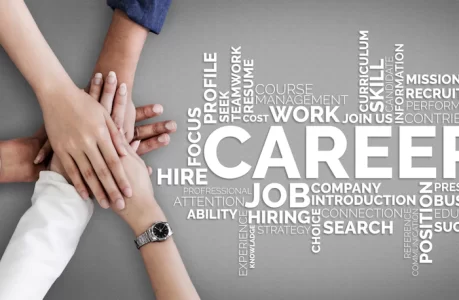Tips To Prepare For A Successful Job Interview

Job interviews are the gateway to a new job and every individual needs some preparation to clear them.
Every interview is different and you cannot have a complete idea of what the interviewers would ask you. Even if you are working in the same industry for years, you might be asked some questions that you never expected.
Therefore, even if you have years of experience, you should prepare yourself to answer all types of questions. From researching the company to handling challenging questions, you need to create a great first impression to grab your favorite job. Apart from answering the questions, you need to be well-dressed and behave like a professional to enhance your chances of success in interviews.
Here Are 14 Pro Tips To Prepare For A Successful Job Interview
This post shares some tips for successful job interviews to help you crack them at the first chance.
1. Company And Industry Research
Dive deep into the company and its industry. Beyond knowing what they do, understand their values, future aspirations, and recent developments. This knowledge enables you to align your responses with their culture and needs. Check their website, do a Google search for recent news, and explore competitors. Going beyond the surface demonstrates your genuine interest and long-term potential.
2. Job Position Details
Before you even step into that interview room, ensure you’ve thoroughly digested the job description. What skills and qualifications are in the spotlight? What challenges will you be expected to conquer? A solid grasp of the role equips you to craft responses that showcase why you’re the perfect match for their unique requirements.
3. Know The Interviewer
Remembering the interviewer’s name and pronouncing it correctly is a simple but powerful gesture. It signals that you’ve prepared. Don’t overlook the secretary’s name, either; they often hold sway in the hiring process. These small courtesies convey your attention to detail and genuine interest in making a favorable impression.
4. Prepare For Common Questions
Anticipate the standard questions and have your responses primed. “Tell me about yourself” is a common opener. Construct a brief yet engaging introduction that spotlights your relevant experience and enthusiasm for the position. Some other common questions are like “Why did you leave your previous company”? What are your salary expectations? So, you should prepare yourself to answer all these questions as they are asked in almost every job interview.
5. Highlight Your Strengths
Highlight your strengths and unique selling points in your resume. Delve into your skills and accomplishments, focusing on those that closely align with the job’s demands. By consistently referencing these strengths throughout the interview, you underscore your qualifications and why you’re the ideal candidate.
6. Active Listening
Active listening isn’t just a vital communication skill; it’s the bedrock of successful interviews. Ensure you thoroughly grasp each question posed. If anything appears unclear, don’t hesitate to seek clarification or rephrase the question to affirm your understanding. Responding thoughtfully, concisely, and staying on point underscores your professionalism.
7. Focus On Your Attributes
Concentrate on your attributes and transferable skills. Instead of dwelling on any experience gaps, emphasize the unique value you bring. Articulate how your abilities can positively impact the organization, demonstrating your potential to contribute meaningfully.
8. Prepare Questions
Come to the interview armed with insightful queries for the interviewer. This showcases your sincere interest in the company and role. Inquire about the company’s objectives, challenges, or expectations for the position. Having these questions at the ready indicates your diligence in research and eagerness for a substantial conversation.
9. Make A Great First Impression
Studies suggest that first impressions crystallize within the initial five minutes of an interview. As you enter, greet the interviewer with genuine enthusiasm and convey your appreciation for their time. Your energy and positivity can lay the foundation for a positive interview experience.
10. Craft Your Stories
Behavioral questions are par for the course in interviews, requiring you to draw from past experiences. While you can’t predict every scenario, having a selection of versatile stories on hand can illustrate your problem-solving skills, adaptability, and achievements effectively.
For example, the interviewer can ask you to describe a stressful situation at work and how you handled it in the past or how you will handle it if such a situation arises. You should be able to craft a story and tell the most appropriate solution to calm down a stressful situation at work.
11. Enhance Your Interview Skills
When it comes to acing interviews, it’s not all about how you answer questions—though that’s crucial. Interviewers also pay attention to your overall interview skills, like active listening, small talk, and empathy.
12. Try Mock Interviews
No matter how well you prepare, it’s natural to feel nervous and overwhelmed during interviews. That’s where mock interviews come to the rescue. They create a realistic interview setting and boost your confidence. Enlist the help of friends or family to conduct mock interviews for you. Consider recording the process to evaluate your performance. And if finding an interviewer is a challenge, practice in front of a mirror.
13. Polish Your Social Media Presence
Social media profiles of candidates tell a lot of things about them. Whether it’s LinkedIn, Facebook, Twitter, or any other platform, ensure your profiles are up to date. Employers often browse your online presence to gauge your personality and background. Take a moment to Google your name and see what pops up. If you come across anything unfavorable, prepare how to address it if the interviewer brings it up.
14. Nonverbal Communication:
Beyond words, nonverbal cues wield substantial influence. Sustain eye contact to project confidence and engagement. Avoid crossing your arms, a sign of defensiveness. Sit upright, leaning forward slightly to convey interest. Your attire and posture should exude professionalism and a genuine desire to leave a lasting impression.
Summing Up
Job interviews can be tough to crack, but with the right preparation, you can pass them easily. Research the company and job thoroughly, be ready to discuss your strengths, and prepare stories that showcase your skills. Active listening and thoughtful questions will further impress your potential employer. Best of luck in your job interview journey!
Read Also:




























Leave A Reply